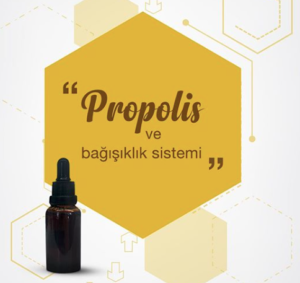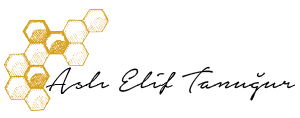
Bağışıklık Güçlendirmek için propolis
The immune system is a complex network of cells, tissues, and organs that defend the body against diseases or foreign bodies. It protects our body against pathogenic microorganisms and any harmful invaders by recognizing and then attacking them to keep us stay healthy.
How can we have a robust immune system?
It is essential to have a healthy, daily diet plan. A well-balanced and nutritious diet should contain 12-15% protein, 55-60% carbohydrates, and 25-30% lipids (composed of unsaturated fatty acids < .0, trans-fatty acids ). It is also advised to avoid consuming foods containing refined sugar, added fat, preservatives, and additives. Pay attention when choosing food in your diet to its nutrient content; if it is rich in antioxidants, vitamins A, D, E, K, and B-complex and minerals such as magnesium, zinc, selenium, and iron.
Which foods are recommended for a healthy diet rich in antioxidants?
According to the American Health Organization, an adult is advised to consume 5-6 servings of vegetables and 6-11 servings of cereals to meet the daily antioxidant requirement of the body. Then we have to ask ourselves if we take that much amount of those foods every day. In general, it is common that we even skip meals in case of a busy schedule. What is the most natural solution to fulfill our antioxidant needs? We can include antioxidant-rich food into our diet, such as propolis, as it is almost 80 times more powerful antioxidant than pomegranate juice. We may easily take all the antioxidants that we need simply by taking 20 drops of propolis every day. Of course, we may add other antioxidant-rich foods like ginger, turmeric, onions, garlic, dark-green veggies (spinach and broccoli), and red-purple berries in our diet plan.
Propolis
Propolis is a natural remedy, produced by bees by collecting resin from the stems, buds, and leaves of the plants, that exhibits antiviral, antibacterial, antifungal, and antioxidant features. Propolis shows the same effects of what they do in the beehive on the human body as well if processed under controlled conditions. It helps the body to fight with diseases by killing viruses and bacteria. Propolis removes harmful free radicals occurring from the metabolic activities and assists the body to be in good shape by contributing to wellness.
Do the antioxidants prevent the cytokine storm?
Based on scientific studies, the answer is yes. Reactive oxygen species play a central role in inflammatory responses and viral replications. However, the antioxidants that exert antiviral and anti-inflammatory effects are also useful for the treatment of cytokine storm induced by severe influenza. Many scientific studies revealed that the antioxidants may reduce the inflammation by suppressing cytokines. Research conducted at Otto Von Guericke University, Germany, demonstrated that propolis and its flavonoid constituents' suppressed cytokines, which cause inflammation in human body cells and improved immunomodulatory regulation. The study investigated the effects of different propolis extracts, the flavonoid hesperidin, quercetin, and caffeic acid phenethyl ester (CAPE) on human immune cell functions. The results showed that propolis and its constituents suppressed phytohemagglutinin-induced DNA synthesis of peripheral blood mononuclear cells and T cells in addition to different types of cytokines. Those results indicated a direct regulatory effect of propolis on the basic functional properties of immune cells. The scientists propose that propolis can be a powerful natural anti-inflammatory medicine influencing different types of immune responses.
More about a healthy immune system;
Last but not least, we have to be careful about consuming the least amount of alcohol and no smoking, taking a regular and sufficient sleep (average 7-8 h), drinking enough water (average 2-2,5 Lt.), and doing regular exercise. The immune system is susceptible to oxidative damage to the cells, and we need to preserve it for functioning correctly.
References:
1. Maggini S, Wintergerst E, Beveridge S, Hornig D, Selected vitamins and trace elements support immune function by strengthening epithelial barriers and cellular and humoral immune responses, British Journal of Nutrition (2007), 98, Suppl. 1, S29–S35.
2. Ansorge S, Reinhold D, Lendeckel U, Propolis and Some of its Constituents Down-Regulate DNA Synthesis and Inflammatory Cytokine Production but Induce TGF-B1 Production of Human Immune Cells, Z. Naturforsch. 580-589, (2003).
